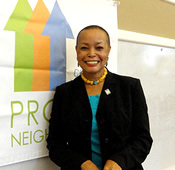Educator to Head Little Rock Promise Neighborhood Effort
Sen. Joyce Elliott, veteran teacher, legislator, and education advocate, has been appointed executive director of the Central Little Rock Promise Neighborhood (CLRPN), a community effort to create a coordinated “cradle to career” pathway for children living in central Little Rock.
 Elliott’s appointment was announced at the Willie Hinton Neighborhood Resource Center Wednesday, Sept. 14, by representatives of lead agencies sponsoring the effort to ensure that all children growing up in central Little Rock have happy, healthy, and productive childhoods and can navigate the road from cradle to career successfully.
Elliott’s appointment was announced at the Willie Hinton Neighborhood Resource Center Wednesday, Sept. 14, by representatives of lead agencies sponsoring the effort to ensure that all children growing up in central Little Rock have happy, healthy, and productive childhoods and can navigate the road from cradle to career successfully.
“The Central Little Rock Promise Neighborhood commitment will forever change the lives of children, families, and other residents within the set boundaries and beyond,” Elliott said at a news conference. “This is not a wish. It’s a promise that will be kept by these eight partners and other supporters who have deliberately chosen to make a difference for generations to come.”
Bobby Roberts, director of the Central Arkansas Library System (CALS), recognized the original CLRPN partners who each stated their organization’s commitment to the program. He introduced two new partners in the initiative, Little Rock Preparatory Academy and the University of Arkansas for Medical Sciences.
“Over the past year more than 300 individuals have been involved in the planning process from the neighborhoods, the schools, the families, and the partners and we’ve worked diligently to create a roadmap for change,” Roberts said. “Now with the leadership of Joyce Elliott, the CLRPN is moving the plan to action.”
The Central Little Rock Promise Neighborhood is the area bounded by Interstate 630 on the north, Boyle Park on the west, Fourche Creek Bottoms to the south, and Martin Luther King Drive on the east. It is comprised of seven tracts from the 2000 U.S. Census: 10, 11, 12, 13, 18, 19, and 21.02. The program will focus on all children who live in the CLRPN area and on all students who attend Bale, Franklin, and Stephens elementary schools, Forest Heights Middle School, Hall High School, and Little Rock Preparatory Academy.
A year ago, the central Little Rock initiative – led by UALR – was one of only 21 Promise Neighborhood initiatives nationally to be awarded a highly competitive planning grant by U.S.Secretary of Education Arne Duncan. More than 330 communities applied. The initiatives are an attempt to replicate the kind of private-public partnerships that has made the renowned Harlem Children’s Zone a model success.
The grant allowed the partners to develop a plan to implement a network of resources for children in the target neighborhoods. The initial partners included Arkansas Children’s Hospital, CALS, the city of Little Rock, Little Rock School District, New Futures for Youth, and UALR.
Elliott, an educator since 1973, has served in the Arkansas General Assembly since 2001, for three terms in the House, chairing the House Education Committee from January 2005 to December 2006. She is completing her first term in the Senate. She was the director of governmental relations for the College Board’s Southwestern Region from 2007 until 2010.
A native of Willisville, Ark., Elliott earned a B.A. degree in English and speech from Southern Arkansas University and a master’s degree in English and education from Ouachita Baptist University. She has been a classroom teacher in the Pulaski County Special School District, El Dorado High School, Leto Comprehensive High School in Tampa, Fla., and in the New Boston Independent School District in Texas.
The CLRPN coalition will implement the “Promise Roadmap,” aligning programs and services, including high-quality early learning programs, ambitious, rigorous, and comprehensive educational reforms; programs that prepare students to be college-ready; and family and community supports.
“The goal is to use the Harlem Children’s Zone approach to make sure children growing up in these neighborhoods get everything they need: great schools, great health care, recreation, after school programs, and family support – whatever it takes,” Elliott said.